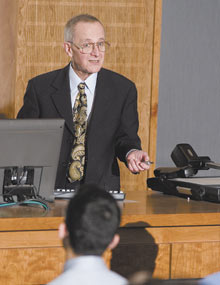  |
| HOME | THIS ISSUE | CALENDAR | GRANTS | BACK ISSUES | < BACK | NEXT > |
Inaugural Rowe Lecture focuses on end-of-life issuesby Scott Brinckerhoff - April 17, 2006 |
||||
|
Launching his lecture with an illustration of a patient in the Middle Ages undergoing gall bladder surgery, Dr. Joseph Civetta of the UConn Health Center invited students Tuesday night to ponder troubling questions that present themselves when medical technology collides with ethics, theology, and economics. The unlucky gall bladder patient in days of yore would be amazed to see modern advances, Civetta said. The large incision in the abdomen that doctors learned to make decades ago has been replaced by laparoscopic surgery and even robotic surgery, in which a doctor looks through goggles and manipulates instruments inside the patient. Organ transplants and the ability to restart a heart have altered the very notion of what constitutes death, he added. The new standard is cessation of brain activity. Medical advances mean that doctors can prolong life as never before, even when a patient’s life may have lost value, dignity, and meaning, Civetta said. So how should we deal with death? To engage the mostly youthful audience, whose thoughts of dying may be remote at best, he used personal recollections, cartoons, and quotations to probe the question. Civetta was the inaugural speaker for the John and Valerie Rowe Lecture Series, which brings distinguished medical scholars to campus to speak about critical topics in health care. Civetta, a surgeon, has written extensively and taught at Harvard Medical School and the University of Miami School of Medicine. Until recently, he was program director of the Integrated General Surgery Residency at the UConn Health Center. “We as a society have a problem facing both life and death,” he said. “Even though we talk about death being a part of life, we use euphemisms like ‘passed away’ or ‘expired,’ and identify with cartoons like the one in which one fellow asks another what he would like to have on his headstone. The answer: ‘He’s not here yet’.” Two principles of medicine – to preserve life and alleviate suffering – are not always compatible, Civetta explained. Another cartoon, this one depicting an ancient man surrounded by machines in intensive care while being queried by a reporter about his wonderful long life, drove home the point.
“We think we’re supposed to be able to save everybody, so we regard somebody dying as a failure. This is viewing death as unnatural, rather than as a successful departure from life,” Civetta said. “We should not be preventing death, but we should be preventing bad dying.” A good death, he suggested, is focused on the patient’s needs, rather than a family’s needs, or the protocols of a health insurance company. But many people – apparently including almost all of Civetta’s audience – have not made their end-of-life wishes known, complicating the direction medical care may take when the time comes. For a Mississippi doctor quoted by Civetta, the answer about what to do medically and when to do it was intuitive: “When the Lord puts his hands on, I take mine off.” Despite all the advances in medical care, “The death rate remains the same, one per person,” Civetta said, quoting a former Department of Health, Education, and Welfare secretary. Civetta encouraged potential caregivers in his audience to spend as much time developing good doctor-patient relationships as they do mastering new technology. He also urged them to become familiar with right-to-die cases, futile vs. worthwhile care, and what constitutes quality of life. He touched on the financial cost of care and joked that one day insurance companies may figure out a way of automatically shutting off care once their payout ceiling is reached, simplifying the dilemma doctors and patients often face. He also introduced his listeners to the “Franklin-Allen” school of medical economics, founded by Benjamin Franklin, who said, “God heals and the doctor takes the fee,” and augmented by Woody Allen, who said, “Death is a great way to cut down expenses.” |
| ADVANCE HOME UCONN HOME |

